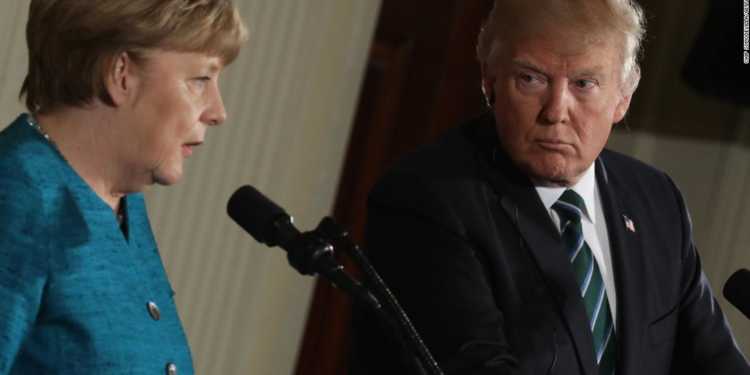In stark contrast to the warm and receptive visit of French President Emmanuel Macron earlier this week, German Chancellor Angela Merkel was welcomed with a very cold and awkward atmosphere. Donald Trump and Angela Merkel have publicly criticised each other’s policies, and those differences were very visible yesterday in Washington. The two heads of state entertained questions from the press, with topics ranging from NATO, economy and the Iran Nuclear Deal.
One of Trump’s greatest complaints with regard to Europe and its NATO allies is that they do not pay the required 2% of GDP on defence as stipulated in the NATO agreement. He said that ‘NATO benefits Europe much more than it does North America, so why does the United States pay such a large portion of the funding?’
“NATO is wonderful but it helps Europe more than us so why are we paying the biggest share?” Trump asked.
Though Trump has often made such arguments, to do so alongside a foreign guest of Merkel’s stature amounted to nothing short of a diplomatic affront. Trump insisted he and the German chancellor “have a great relationship,” but their body language suggested otherwise. Merkel, who is used to being the most powerful person in the room, stood stone faced next to Trump in the East Room, looking away as he spoke, pursing her lips.
Trump then went onto say that there is a lot of potential for the growth of relations between the United States and Europe, and turning to Merkel, he stressed that “it should be a fair one.” This was a direct reference to the $150 Billion deficit the United States has with Europe, and served as a gentle reminder to Merkel that the exemptions enjoyed by Europe on Steel and Alumiunium imports from the United States would be scrapped by Tuesday provided that there is no action to reduce the deficit.
Asked if she’d succeeded in convincing Trump to cancel planned steel and aluminum tariffs on Europe, Merkel offered a curt response: “The president will decide. That is very clear.”
Her answer betrayed the extent to which Germany, and by extension Europe, is at Trump’s mercy. The proposed tariffs would hit Germany’s auto industry. Many fear the moves could lead to a more serious trade conflict between the U.S. and Europe.
On her first visit to Washington since re-election, Merkel had been expected to back up Macron’s case for defending the Iran nuclear deal, which Trump is threatening to scrap. The chancellor acknowledged that the deal is “anything but perfect – it will not solve all the problems with Iran”, but she described it as a building block. She said Trump must decide whether the US would withdraw.
He offered no fresh clues to his thinking but said: “They will not be doing nuclear weapons. That I can tell you. They’re not going to be doing nuclear weapons. You can bank on it.”
All in all, it was a rather awkward meeting between the two leaders who struggled to hide their differences in front of the press. While Merkel was unable to prevent her facial expressions from showing through with grimaces at every opportunity as a response to some of Trump’s remarks, Trump used every opportunity to take an indirect jibe at Merkel, stressing that any possible relationship will have to be “equal”, and that the United States will not be ready to enter cooperation if it feels it is being disadvantaged, or rather, in Trump’s language, ‘Ripped Off’.

























